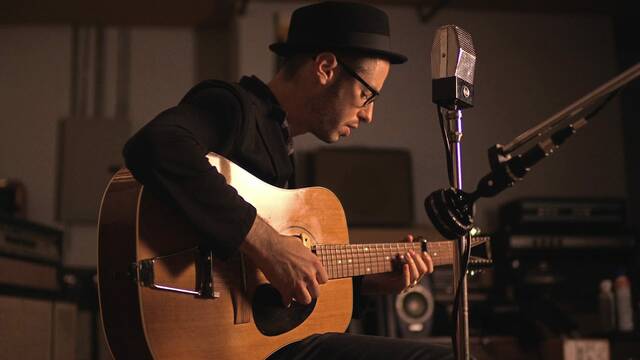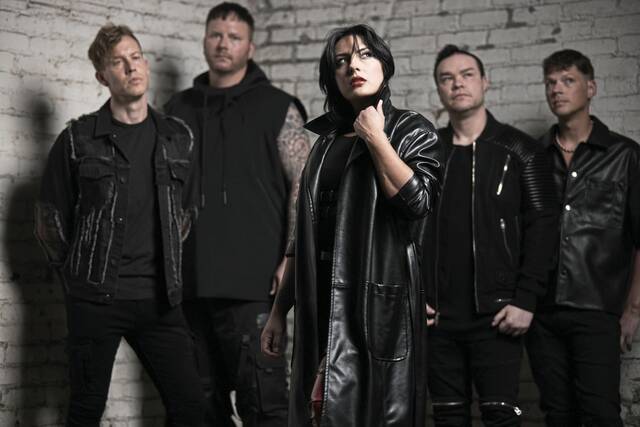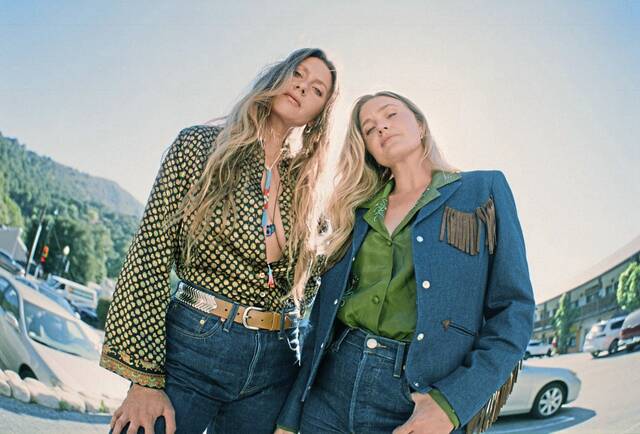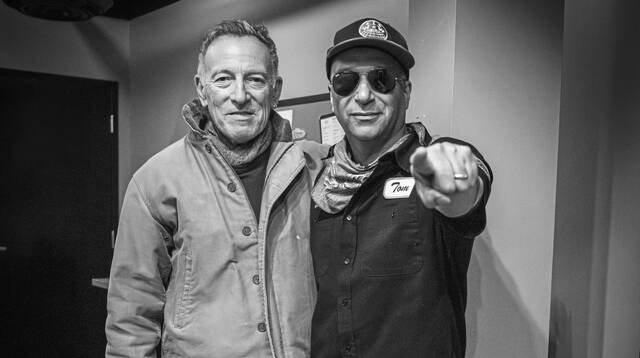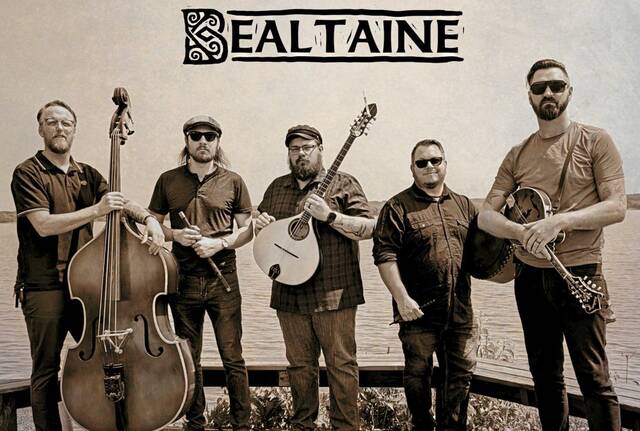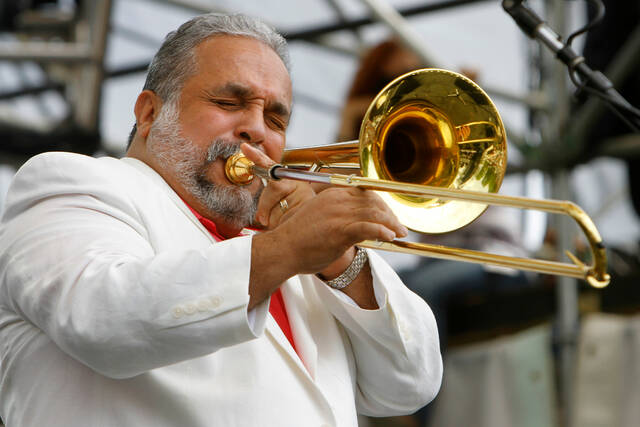Singer-songwriter Ryan Lee Crosby calls his latest album an “authentically made modern-day analog field recording of a century-old blues tradition.”
The new album, “At the Blue Front,” was released Aug. 20 and recorded at the Blue Front Cafe — considered the oldest juke joint in the U.S. — in Bentonia, Mississippi. The album features Jimmy “Duck” Holmes, noted as the last of the Bentonia bluesmen.
Crosby could showcase some of those new songs when he plays Wednesday at the new location of Acoustic Music Works in Pittsburgh’s South Side. The guitar store, formerly located in Squirrel Hill, is celebrating its grand opening with four nights of free shows, including Crosby’s appearance.
In a call from Rhode Island, Crosby spoke with TribLive about what he learned from an elder statesmen of the blues, the Bentonia style and more. Find a transcript of the conversation, edited for clarity and length, below.
You worked with Jimmy “Duck” Holmes on the record, so how did you first meet him?
I was playing in Mississippi, and somebody posted a video of me playing in the street in Clarksdale, and I got a note through Instagram from somebody who’s now very close to me named Gilbert Vowell, who I didn’t know at the time, and he asked when I was coming back to Mississippi. I said I wasn’t sure but what I really want to do is meet Jimmy “Duck” Holmes in Bentonia. I didn’t know that Gilbert worked with Jimmy. That was in 2019, so Gilbert told me he could arrange a meeting, so I flew down from Boston to meet Jimmy and pretty much from day one, that was it. I just started learning from him and going to see him two or three times a year, and I’ve done that almost every year since then.
What kind of knowledge has he passed on to you?
Some of it is about how to play the Bentonia style blues. I think there’s a lot also about how to improvise and compose spontaneously, how to play from the heart, but also I think how to try to be a kind and caring person too.
I assume these are lessons that you soak up being around him and witnessing him in action.
Yeah, I think a lot of it’s internal. In terms of the actual teaching instruction, it’s often not much more than “Watch my hands” or “If you want to know where I am, watch my foot.” A lot of times that’s essentially what the teaching has been, but from there, it’s up to the students to take from that what they will.
How would you describe the Bentonia style of music for people who haven’t heard of it before?
It’s traditional blues from Mississippi that goes back at least a hundred years. The first instance of it being reported I think is in 1931. So I figure it was happening before that. It is a very hypnotic and ethereal-sounding music that is highly improvised, even though there’s traditional themes to the music. It’s very much played in the moment. It’s been described or thought of as, even within the kind of genre of Mississippi country blues, the Bentonia style has really got its own sound. Some people think it’s brooding or it’s got a heaviness to it. There’s themes of the supernatural woven in to some of it. It’s arguably pretty spooky and otherworldly sounding music at times.
How did you first hear about that style?
A dear friend of mine, we grew up together and we’re still very close, he’s always been a blues enthusiast. He introduced me to the music of Skip James probably close to 15 years ago. Skip James was the first musician from Bentonia to be recorded, and he was an influence on Robert Johnson and many other blues musicians. Skip James was somebody who didn’t receive a lot of recognition in his lifetime. He got some toward the tail-end of his life in the 1960s, but his early 1930s recordings just faded into obscurity right after they made them. I heard those early recordings about 15 years ago. It sounds dramatic, but I felt it then and I can say it now, that hearing that music really changed the direction of my whole life.
From what I read, you used to play in a post-punk type band, so was hearing that what shifted you or had you been on that path earlier?
I heard Skip James very early on in what felt to me just like a pivotal moment in which my life and music was changing anyway. But really my playing and my whole way of relating to music has changed really dramatically, both around the influence of the Bentonia blues.
Related
• Reunited indie rockers Rilo Kiley revisit heyday in sold-out Roxian show• Q&A: James McMurtry on touring, new album, why he writes and more ahead of Pittsburgsh show
• 2025 Pittsburgh area concert calendar
You use a 12-string electric guitar on this record. How does that change or affect the music of this style?
To me, in the way I play it, not really at all. I think it works well with the music because there is such an element of drone, the lower notes are always in this rhythmic, cyclical drone and it’s an open tuning. Bentonia’s style is often played in an open tuning so there’s a lot of notes ringing all the time anyway. I think the 12-string accentuates that, but for me personally — and I see this in Jimmy’s playing too — there’s no real difference for me whether I play electric or acoustic or six-string or 12-string, I mean, subtle little differences. But for me, the use of the electric guitar on this record is I just thought it would be a little more stable than bringing my acoustic guitar, going from New England to Mississippi and climate change. The electric guitar can get knocked around a little more travel, but I don’t think I played any differently as a result.
Did you like the immediacy, the spontaneity of the recording process? You did this in two days on an old reel-to-reel recorder, right?
Yeah, we actually did two records in two days. There’s “At the Blue Front” and then we put out a record under Jimmy’s name called “Bentonia Blues/Right Now,” and those two albums were recorded on a Monday afternoon and a Tuesday afternoon. A lot of that was really just following Jimmy’s lead because he basically says, “No rehearsals. Don’t talk about it. Just play it and play differently every time.” There’s no second takes or anything.
So these are all first takes?
It’s hard for me to remember now, but a couple of the songs where Jimmy doesn’t play — one called “I’ve Been Worried,” “Mistreating People” and “I’m Gonna Change” — it’s possible that any of those might be a second take, but I don’t think there was anything done in more than two takes. Anything with Jimmy on it is most definitely a first take because you wouldn’t even think of asking him to do a second take.


